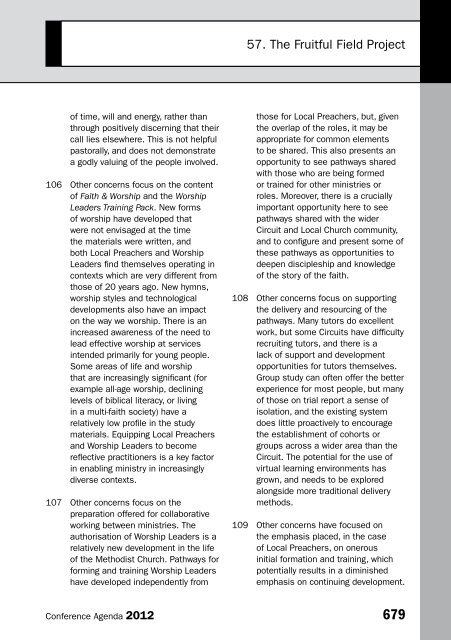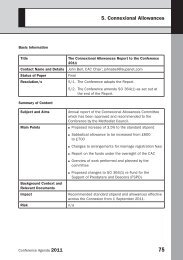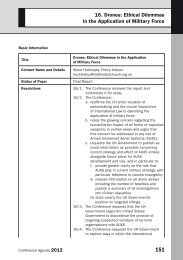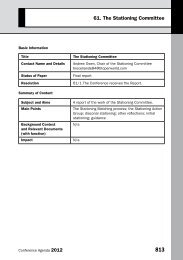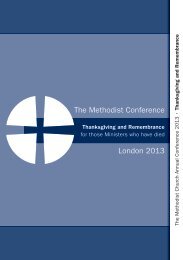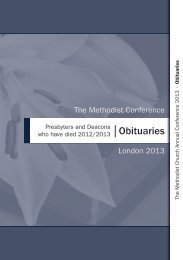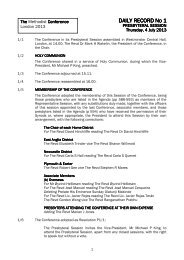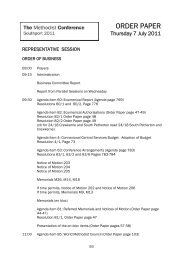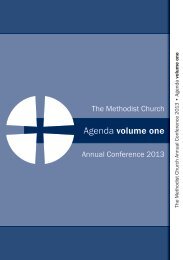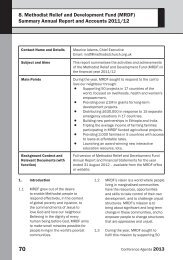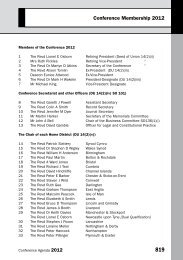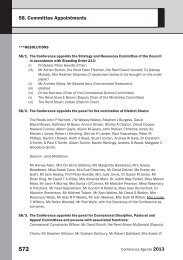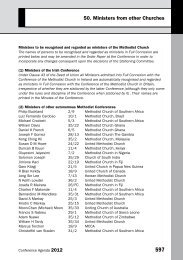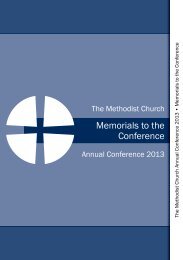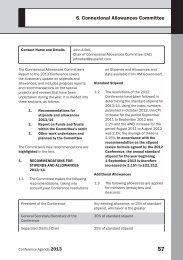Agenda Volume 3 - Methodist Conference
Agenda Volume 3 - Methodist Conference
Agenda Volume 3 - Methodist Conference
You also want an ePaper? Increase the reach of your titles
YUMPU automatically turns print PDFs into web optimized ePapers that Google loves.
57. The Fruitful Field Project<br />
of time, will and energy, rather than<br />
through positively discerning that their<br />
call lies elsewhere. This is not helpful<br />
pastorally, and does not demonstrate<br />
a godly valuing of the people involved.<br />
106 Other concerns focus on the content<br />
of Faith & Worship and the Worship<br />
Leaders Training Pack. New forms<br />
of worship have developed that<br />
were not envisaged at the time<br />
the materials were written, and<br />
both Local Preachers and Worship<br />
Leaders find themselves operating in<br />
contexts which are very different from<br />
those of 20 years ago. New hymns,<br />
worship styles and technological<br />
developments also have an impact<br />
on the way we worship. There is an<br />
increased awareness of the need to<br />
lead effective worship at services<br />
intended primarily for young people.<br />
Some areas of life and worship<br />
that are increasingly significant (for<br />
example all-age worship, declining<br />
levels of biblical literacy, or living<br />
in a multi-faith society) have a<br />
relatively low profile in the study<br />
materials. Equipping Local Preachers<br />
and Worship Leaders to become<br />
reflective practitioners is a key factor<br />
in enabling ministry in increasingly<br />
diverse contexts.<br />
107 Other concerns focus on the<br />
preparation offered for collaborative<br />
working between ministries. The<br />
authorisation of Worship Leaders is a<br />
relatively new development in the life<br />
of the <strong>Methodist</strong> Church. Pathways for<br />
forming and training Worship Leaders<br />
have developed independently from<br />
those for Local Preachers, but, given<br />
the overlap of the roles, it may be<br />
appropriate for common elements<br />
to be shared. This also presents an<br />
opportunity to see pathways shared<br />
with those who are being formed<br />
or trained for other ministries or<br />
roles. Moreover, there is a crucially<br />
important opportunity here to see<br />
pathways shared with the wider<br />
Circuit and Local Church community,<br />
and to configure and present some of<br />
these pathways as opportunities to<br />
deepen discipleship and knowledge<br />
of the story of the faith.<br />
108 Other concerns focus on supporting<br />
the delivery and resourcing of the<br />
pathways. Many tutors do excellent<br />
work, but some Circuits have difficulty<br />
recruiting tutors, and there is a<br />
lack of support and development<br />
opportunities for tutors themselves.<br />
Group study can often offer the better<br />
experience for most people, but many<br />
of those on trial report a sense of<br />
isolation, and the existing system<br />
does little proactively to encourage<br />
the establishment of cohorts or<br />
groups across a wider area than the<br />
Circuit. The potential for the use of<br />
virtual learning environments has<br />
grown, and needs to be explored<br />
alongside more traditional delivery<br />
methods.<br />
109 Other concerns have focused on<br />
the emphasis placed, in the case<br />
of Local Preachers, on onerous<br />
initial formation and training, which<br />
potentially results in a diminished<br />
emphasis on continuing development.<br />
<strong>Conference</strong> <strong>Agenda</strong> 2012 679


